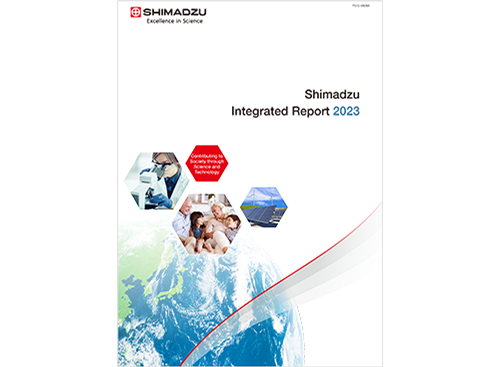Basic Policy
The Shimadzu Group is engaged in establishing and improving systems for corporate governance, which it considers as the core systems that provide the basis for corporate management practices used to execute quick bold decision-making and measures for ensuring management transparency and fairness and for increasing management vitality. Shimadzu established the Corporate Governance Policy (hereinafter “CG Policy”) in December 2015 as a declaration of Shimadzu’s stance regarding actually implementing the Corporate Governance Codes (hereinafter “CG Codes”) in practice. In addition to improving corporate governance measures, Shimadzu is also committed to improving the effectiveness of governance practices by periodically reviewing the CG Policy with respect to changes in the circumstances of such measures or external conditions.
Corporate Governance Policy
- Appropriate Cooperation with Stakeholders
- Securing the Rights and Equal Treatment of Shareholders
- Ensuring Appropriate Information Disclosure and Transparency
- Dialogue with Shareholders
- Responsibilities of the Board of Directors, etc.
Corporate Governance Measures
With regard to the CG Code, we continue to be fully compliant with all Basic Principles, Principles, and Supplementary Principles, including items applicable only to the prime market. Shimadzu’s major corporate governance initiatives for FY 2023 are as follows.
CG Policy
https://www.shimadzu.com/ir/governance/policy.html
CG Report
https://www.shimadzu.com/ir/governance/report.html
Implementing Sustainability Management Initiatives
Under the Shimadzu Group Sustainability Charter and the Sustainability Management Implementation Policy, KPIs have been set for each department, and the Group’s sustainability management initiatives have begun to be fully implemented.
As part of these efforts, in May 2022, we revised the existing Corporate Code of Ethics and established the Shimadzu Group Corporate Code of Ethics as common rules for the entire Group in order to ensure thorough legal compliance and further improve corporate ethics throughout the Shimadzu Group. Shimadzu has also compiled a “Shimadzu Group Corporate Ethics Guidelines” that outlines the code of conduct that all Shimadzu Group employees must follow in their day-to-day work in order to spread awareness of corporate ethics and compliance throughout the Group.
Furthermore, in June 2022, we established the Regulation for Sustainability Management of SHIMADZU Group to clarify the framework and organizational structure for promoting initiatives related to sustainability management. The Shimadzu Group Sustainability Meeting is now positioned as the highest deliberative body for sustainability management and promotes Shimadzu Group-wide efforts for sustainability management, including the existing Risk Management and Corporate Ethics Board and Environmental Meeting.
Reinforcing the Group Governance
In February 2023, we established the “Shimadzu Group Management Basic Regulation” to set forth our basic approach to group management and guidelines to be followed. In this way, the Shimadzu Group is working together to establish a system that ensures appropriate and efficient group management for sustainable growth. In addition, the regional corporate head offices established outside Japan last year, mainly involving the local organizations in China and Asia, are using the auditing tools created by the Head Office in Japan to establish and execute audit visit plans. Verifying compliance with the Shimadzu Group Management Basic Regulation and the use of rules at each Group company has led to preventing inappropriate procedures and other measures.
Criteria for Independence of Outside Directors and Audit & Supervisory Board Members
If none of the following apply, Outside Directors and Outside Audit & Supervisory Board members (including candidates) shall have independence from Shimadzu, with no risk of a conflict of interest with general shareholders.
| (1) | Major supplier of Shimadzu (a company that received payments from Shimadzu equivalent to 2% or more of their annual consolidated sales revenue during the previous fiscal year) or an executive officer of that company |
| (2) | Major customer of Shimadzu (a company that paid Shimadzu an equivalent of 2% or more of Shimadzu’s annual consolidated sales revenue during the previous fiscal year) or an executive officer of that company |
| (3) | Consultant, accounting expert, or legal expert (including persons affiliated with a corporation, association, or other organization that received applicable assets) who receives any large monetary or asset compensation from Shimadzu other than the designated director compensation (monetary or asset compensation equivalent to 10 million yen or more, excluding the director compensation, received during the previous fiscal year) |
| (4) | Persons for which any of the conditions (1) to (3) applied within the past year |
| (5) | Relatives within a second-degree kinship to a person indicated in 1. to 3. below (excluding those without importance).
|
Appointment and Compensation Committee
Shimadzu established the Appointment and Compensation Committee as an optional advisory body to the Board of Directors for the purpose of strengthening the independence, objectivity, and accountability of the Board of Directors.
This committee resolves and deliberates on matters related to appointments and compensation in accordance with the committee rules. During the fiscal year under review, the committee’s specific deliberations included the items in the table below.
The committee met six times during FY2023.
■Main Activities of the Appointment and Compensation Committee during the Last Fiscal Year
| Appointment Activities |
|
|---|---|
| Compensation Activities |
|
Evaluating the Effectiveness of the Appointment and Compensation Committee
In addition to evaluating the effectiveness of the Board of Directors, a survey about the effectiveness of the Appointment and Compensation Committee has been conducted annually since 2019, the year when the committee was established.
Survey questions primarily involve (1) CEO successor training plan and (2) management incentives. Evaluation results have been generally positive.
Composition of Appointment and Compensation Committee
The Appointment and Compensation Committee is composed of Representative Directors and Outside Directors, with a majority of the members consisting of Outside Directors. The independence of appointments and compensation is increased by generally appointing an Independent Outside Director as the committee chair.
| Name | Appointment and Compensation Committee |
|---|---|
| Outside Director | 4 |
| Internal Director | 2 |
| Members | 6 |
Members of the Appointment and Compensation Committee
| Chairman: | : | Nobuo Hanai (Outside Director) |
| Members | : | Yoshiyuki Nakanishi (Outside Director) Nami Hamada (Outside Director) Mie Kitano (Outside Director) Teruhisa Ueda (Representative Director, Chairman of the Board) Yasunori Yamamoto (Representative Director, President) |
Policy on Method for Deciding Director and Audit & Supervisory Board Member Compensation
Shimadzu’s executive compensation regulations stipulate the procedures for determining the compensation of directors, Audit & Supervisory Board members, and executive officers with specific duties, as well as the compensation structure. In addition, a “Policy on Method for Deciding Director and Audit & Supervisory Board Member Compensation” is also established upon resolution by the Board of Directors based on the deliberations and reports of the Appointment and Compensation Committee.
Compensation for Directors and executive officers with specific duties is decided by Appointment and Compensation Committee members appointed by the Board of Directors within the range decided at the Annual Shareholders’ Meeting. Then the results are reported to the Board of Directors. Compensation for Audit & Supervisory Board members is decided through discussion with the Audit & Supervisory Board members.
Director and Audit & Supervisory Board Member Compensation System
Compensation for directors (excluding outside directors) and executive officers with specific duties (collectively referred to as “Director or Officer” below) comprises monetary compensation that includes a base amount and a short-term performance-linked compensation amount that varies depending on performance, plus non-monetary stock compensation, while also taking into consideration the management duties of the Director or Officer with respect to expanding our business results during each fiscal year and increasing medium-and long-term corporate value.
Compensation for outside directors only includes a base compensation amount decided based on their expected roles and duties as an outside director.
Compensation for Audit & Supervisory Board members only includes a base compensation amount decided based on their duties.
| Compensation Classification |
Internal Director |
Outside Director |
Audit & Supervisory Board Member |
Remarks |
|---|---|---|---|---|
| Base Compensation | ○ | ○ | ○ | From the perspective of deciding compensation based on objective information, while also providing a level that is sufficient to enable recruiting talented human resources, compensation is decided based on the candidate’s current position and intended role, using the compensation offered by similar companies (group of benchmark companies of a similar size and in a similar type of business), to be determined by a survey performed by an outside specialist company, as an important reference level. |
| Compensation Linked to Short-Term Performance | ○ | ー | ー | Compensation is decided based on overall consideration of the year-on-year growth rate of consolidated net sales and operating income, an evaluation of the performance of the specific department the executive officer with specific duties is in charge of, and a personal evaluation. |
| Stock Compensation | ○ | ー | ー | This compensation is provided to share value with the shareholders, increase the incentive for expanding performance and increasing corporate value. It comprises a short-term performance-linked portion and a medium/ long-term performance-linked portion. Short-Term Performance-Linked Portion This is a portion of short-term performance-linked compensation included as stocks. It is provided to directors or others in the form of stocks that can only be transferred at a specific time each year. The transfer restriction on those stocks is canceled when the director or other recipient retires. The ratio of stocks provided is decided by the Appointment and Compensation Committee on a case-by-case basis. Medium/Long-Term Performance-Linked Portion For directors, for example, the number of shares provided for each position is decided based on the degree to which performance targets specified were achieved in the final year of the medium-term management plan. Compensation can vary within the 50 to 200% range, given the target achievement degree is determined based on target values for consolidated net sales and operating income as performance indicators. If a director or other employee commits a serious violation of their job duties or company regulations, they will forfeit their right to benefit from scheduled issues of stock and a system is established to charge a monetary amount equivalent to the stock value provided. |
■Director and Audit & Supervisory Board Member Compensation Status (FY2023)
| Classification | Number of Applicable Directors and Audit & Supervisory Board Members | Fixed Compensation (million yen) | Compensation Linked to Performance (million yen) | Total (million yen) | |
|---|---|---|---|---|---|
| Compensation Linked to Short-Term Performance | Stock Compensation Linked to Medium/ Long-Term Performance2 (Recorded Expense-Based Value) | ||||
| Director (Internal) | 5 | 196 | 179 | 17 | 393 |
| Audit & Supervisory Board Member (Internal) | 2 | 54 | - | - | 54 |
| Outside Director | 4 | 56 | - | - | 56 |
| Outside Audit & Supervisory Board Member | 3 | 23 | - | - | 23 |
| Total | 14 | 330 | 179 | 17 | 527 |
- 1. The above includes compensation paid to one director (excluding outside directors) who retired on June 28, 2023 and one outside Audit & Supervisory Board member.
- 2. The system for stock and non-monetary compensation linked to medium/long-term performance is intended to provide a quantity of stock every 3 years based on the extent to which the performance targets for the final year of the medium-term management plan were achieved. However, implementing the system requires recording that stock compensation as an expense each year. The compensation value indicated above is based on the recorded expense calculated by multiplying the number of points attributable to directors (excluding outside directors) for the given fiscal year by the market stock price, assuming a trust purchased Shimadzu stock. However, actual stock compensation is determined after the medium-term management plan is finished.
- 3. Employee salaries for officers concurrently serving as employees are not listed as there is nothing applicable.
Board of Directors
Activities of the Board of Directors
The Board of Directors discusses, resolves, and reports on important matters in accordance with laws and regulations, the Articles of Incorporation, and the rules of the Board of Directors. The following is a summary of specific matters considered by the Board of Directors during the fiscal year under review.
Major Matters Discussed by the Board of Directors during the Last Fiscal Year
- Progress of implementing business strategies specified in the medium-term management plan (FY2023 to FY2025) and reinforcing the management base
- Strategies for North America
- Important organizational changes associated with the phased transition to regional control
- Acquisition of Zef Scientific, Inc.
- Current status of Shimadzu Diagnostics and future outlook
- Revisions to Shimadzu Group Sustainability Charter
- Revisions to Shimadzu Group Management Basic Regulation
- Building a global foundation for growth aimed at strengthening Shimadzu Group management
- Disclosure of human capital information
Evaluating the Effectiveness of the Board of Directors
Every year, we analyze and evaluate the effectiveness of the directors and auditors who make up the Board of Directors. Again this year, we conducted an independent survey for assessing effectiveness. The survey covered the same following three topics as last year, but some of the questions were revised: 1. Changes over time, 2. New issues since the previous year, 3. Future revisions. Based on the survey results, the Board of Directors held discussions focusing on areas in need of improvement. The following is a summary of the results of the effectiveness evaluation based on discussions at the Board of Directors meetings.
Summary
The result of the assessment was that good effectiveness was maintained since improvements were implemented the previous year, but that additional improvements are required. The Board of Directors is contributing appropriately to the deliberation of monitoring the progress of business strategies and the medium-term management plan. The composition of the current Board of Directors was judged as adequately fulfilling the role of maintaining an environment where differing views can be freely expressed by all members. Compared to the previous year, progress was achieved in terms of selecting discussion topics, modifying documents for efficient discussions, expanding opportunities to discuss risk management and Group governance, and exchanging, recognizing, and sharing information needed by outside directors and Audit & Supervisory Board members. In contrast, improvements will be implemented this fiscal year to enable productive discussions regarding particularly important topics, such as monitoring business strategies and monitoring M&A projects.
| Criteria for Evaluating Effectiveness | FY2023 (Applicable year: FY2022) |
|---|---|
| Composition of the Board of Directors | The size of the Board of Directors (12) and its composition (half being outside directors) were positively rated. We will continue to discuss the composition of the Board so that it will contribute to monitoring strategy and strengthening governance. |
| Operation of Board of Directors Meetings | Though some improvements were made in terms of allocating time for discussion and providing meeting documents, which were also issues the previous year, it was judged that there is still room for improvement, such as with respect to reducing the number of pages and improving the quality of executive summaries. To ensure Board of Directors meetings can be operated with an emphasis on discussions, we will improve documentation to include clear and succinct discussion points, provide opportunities, schedule off-site meetings where executive officers on the board can engage in focused discussions with directors on the board, and provide more time for important topics that can help increase corporate value. |
| Roles and Responsibility of the Board of Directors | The evaluation showed that the roles and responsibilities of the Board of Directors are being adequately fulfilled. Topics where efforts should continue to be made include the business portfolio, strategies outside Japan, and investments in research and development. We will continue to work on these as important themes. |
| Self-Assessment by Directors | All Board of Directors members were judged to be aware of Shimadzu’s basic philosophy and their expected roles, engaged in lively discussions based on their diverse backgrounds, and effective. |
| Support for and Cooperation with Directors and Audit & Supervisory Board Members | Adequate sharing of information and awareness between outside directors and corporate auditors is being carried out appropriately. Adequate opportunities for exchanging views between outside directors and accounting auditors/internal audit departments have been ensured, but ongoing improvements will be made due to inadequate information sharing. Furthermore, measures to improve outside director knowledge and understanding of Shimadzu will be systematically implemented, such as by conducting facility tours and exchanging views with employees. |
| Dialogue with Shareholders and Investors | Again this year, the assessment indicated that there is an issue with providing information regarding the company’s dialogue with shareholders and institutional investors. In addition to sharing more information about executive IR activities, we will also provide more opportunities for dialogue with shareholders and institutional investors. |
Cross-Shareholdings
1.Policy on Cross-Shareholding
Shimadzu holds stocks that Shimadzu judges will result in increasing medium-and long-term corporate value, from a management strategy perspective. Each year, the Board of Directors verifies the appropriateness of holdings, by confirming whether the overall scale of cross-shareholdings is appropriate and then confirming whether the holdings of individual stocks are appropriate for the given objectives for holding the respective stocks and whether the benefits and risks from holding the stocks are commensurate with the corresponding cost of capital and other factors. Holdings of stocks not consistent with the cross-shareholding policy will be reduced.
Based on the cross-shareholding policy indicated above, the holdings of 31 stocks were decreased by 5.0 billion yen during the five-year period from FY2018 to FY2022. However, in FY2023, all stocks continue to be held due to an assessment that resulted in confirming the suitability of holding the stocks.
2.Stocks Held by Shimadzu for Reasons Other Than Net Investment Purposes
As of March 31, 2024, the number of stocks held for purposes other than net investment was 2.1% of consolidated total assets and 2.9% of consolidated net assets. The number and value of stocks included on the consolidated balance sheet are indicated as follows.
Number of Stocks(Stock types)
| FY2019 | FY2020 | FY2021 | FY2022 | FY2023 | |
|---|---|---|---|---|---|
| Unlisted Stocks | 30 | 30 | 30 | 30 | 28 |
| Stocks Not Unlisted | 36 | 30 | 24 | 22 | 22 |
Value of Stocks Included on Balance Sheet(Million yen)
| FY2019 | FY2020 | FY2021 | FY2022 | FY2023 | |
|---|---|---|---|---|---|
| Unlisted Stocks | 525 | 519 | 612 | 1,530 | 1,381 |
| Stocks Not Unlisted | 10,418 | 11,907 | 11,405 | 10,426 | 13,054 |
3.Shareholder Voting Criteria
Shimadzu exercises voting rights for all cross-shareholdings subject to a vote if it is judged that doing so would increase shareholder value. To ensure we exercise our voting rights appropriately, we check the content of each proposal being voted on based on decision criteria specified for each proposal, such as appropriation of retained earnings, appointment of directors or Audit & Supervisory Board members, or establishment of measures to defend against a takeover. For issues involving particularly serious concerns, such as a social scandal, we consider our vote very carefully.









